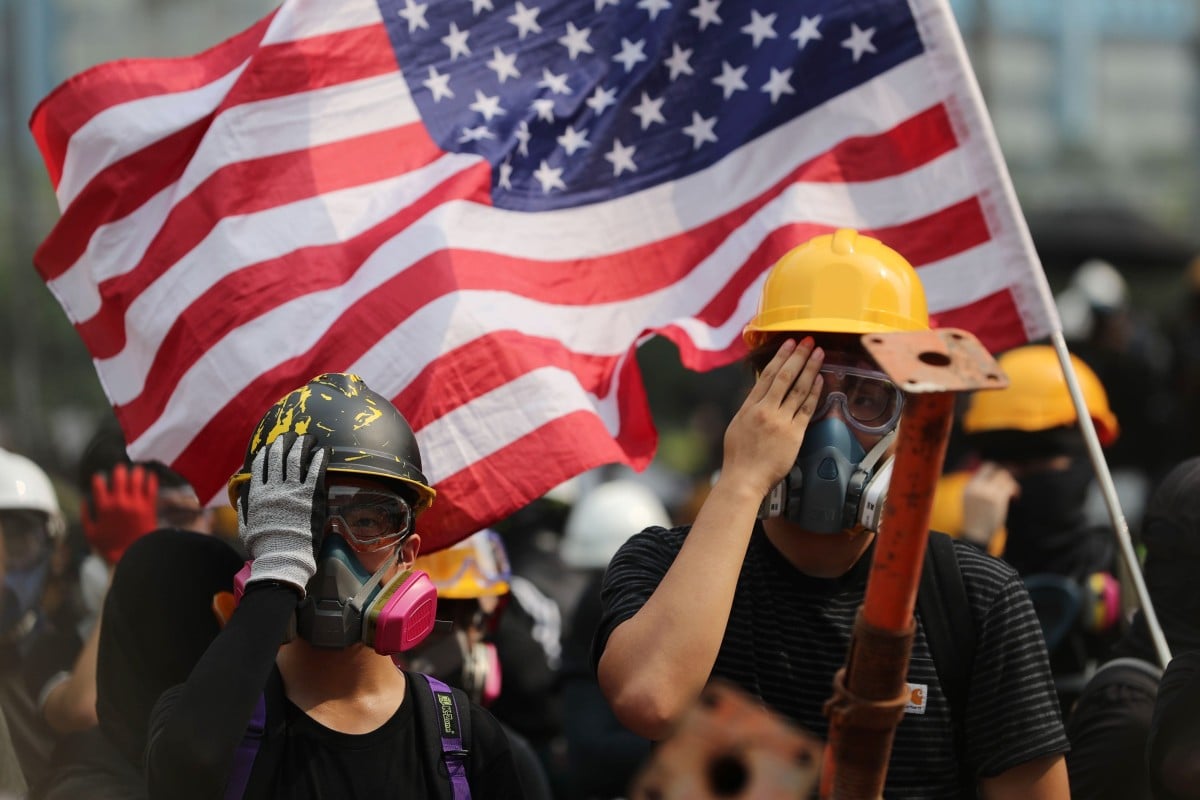- A violent suppression of Hong Kong protesters could have stark consequences for world trade and world peace
- It is, therefore, in world leaders’ interests to draw clear boundaries for Beijing over how to respond to them

Protesters in the Ngau Tau Kok area of Hong Kong on August 24 wave the US flag, as others cover their right eye in tribute to a woman who suffered a serious eye injury during anti-government protests outside a police station two weeks before.
During the protests over the presidential election results in Iran in 2009, I was teaching an MBA course at the University of Malaya.
Three of my students were Iranians, one of whom looked like he was in his early 50s, about my age. We had established a friendly “old guys” rapport during the first weeks of the course and I was enjoying learning as much from him as I hoped he was from me.
At a break one evening, after the protests had turned deadly, I walked over to talk to him.
At a break one evening, after the protests had turned deadly, I walked over to talk to him.
“Crazy stuff back home,” I said, trying to make conversation, but not sure what his politics was.
“I hope your family and friends are all OK.”
He didn’t say anything for a few seconds.
He didn’t say anything for a few seconds.
When he began, he spoke quietly.
He said that he had demonstrated when he was young, decades earlier, full of the same outrage and bravado Iranians were showing in 2009.
His voice began to crack as he told me that he had been imprisoned as a result, horribly losing a few years of his life for demonstrating.
“Those young kids,” he said, beginning to choke up.
“They have no idea what those people are going to do to them.”
The week before the elections, then-US president Barack Obama had given a speech in Cairo that gave hope to many in the Muslim world that his administration would be conciliatory after eight years of war in Afghanistan and Iraq.
The week before the elections, then-US president Barack Obama had given a speech in Cairo that gave hope to many in the Muslim world that his administration would be conciliatory after eight years of war in Afghanistan and Iraq.
His speech, and his tough words towards the mullahs when the violence began, seemed to give hope to the protesters that somehow the US would help them.
We didn’t.
Watching the demonstrations in Hong Kong grow more violent by the day, and seeing some young Hongkongers waving American flags, it’s hard to not believe the US is going to break their hearts too, and they’re going to suffer soon, tragically and indelibly, with nothing to show for it in the end.
We didn’t.
Watching the demonstrations in Hong Kong grow more violent by the day, and seeing some young Hongkongers waving American flags, it’s hard to not believe the US is going to break their hearts too, and they’re going to suffer soon, tragically and indelibly, with nothing to show for it in the end.
Everyone sees where the protests are likely to be headed.
What are the democracies going to do after thousands of Hongkongers have lost their freedom or their lives?
Now is the time for action, not after the bad thing happens.
Now is the time for action, not after the bad thing happens.
Beijing says that Hong Kong is an internal matter and warns the rest of the world to mind its own business.
But Hong Kong – Asia’s world city – is everyone’s business.
A violent repression of Hong Kong’s protesters will impact the entire world with consequences that no one can predict.
A group of respected leaders from democracies in China’s neighbourhood, Britain and the US should coordinate immediately and invite themselves to Beijing.
A group of respected leaders from democracies in China’s neighbourhood, Britain and the US should coordinate immediately and invite themselves to Beijing.
There’s no reason China’s leaders can’t host them for “informal” talks, giving everyone the face that is so important in the region.
While this may sound impractical or like something that’s not done, this is not a time for business-as-usual diplomacy.
The message to Beijing should be straightforward: “China’s business today is everyone’s business. Talk with us about Hong Kong. Nobody is trying to tell you what to do, but certain moves will lead all of us to a bad place.”
Once a violent repression starts, it will be too late, and the damage will extend far beyond Hong Kong.
The world economy will suffer and, worse, so may world peace.
The reticence of last century’s “leaders” led to two catastrophes.
The reticence of last century’s “leaders” led to two catastrophes.
Now is the time for this century’s leaders to step up, before we creep towards another.
Aucun commentaire:
Enregistrer un commentaire